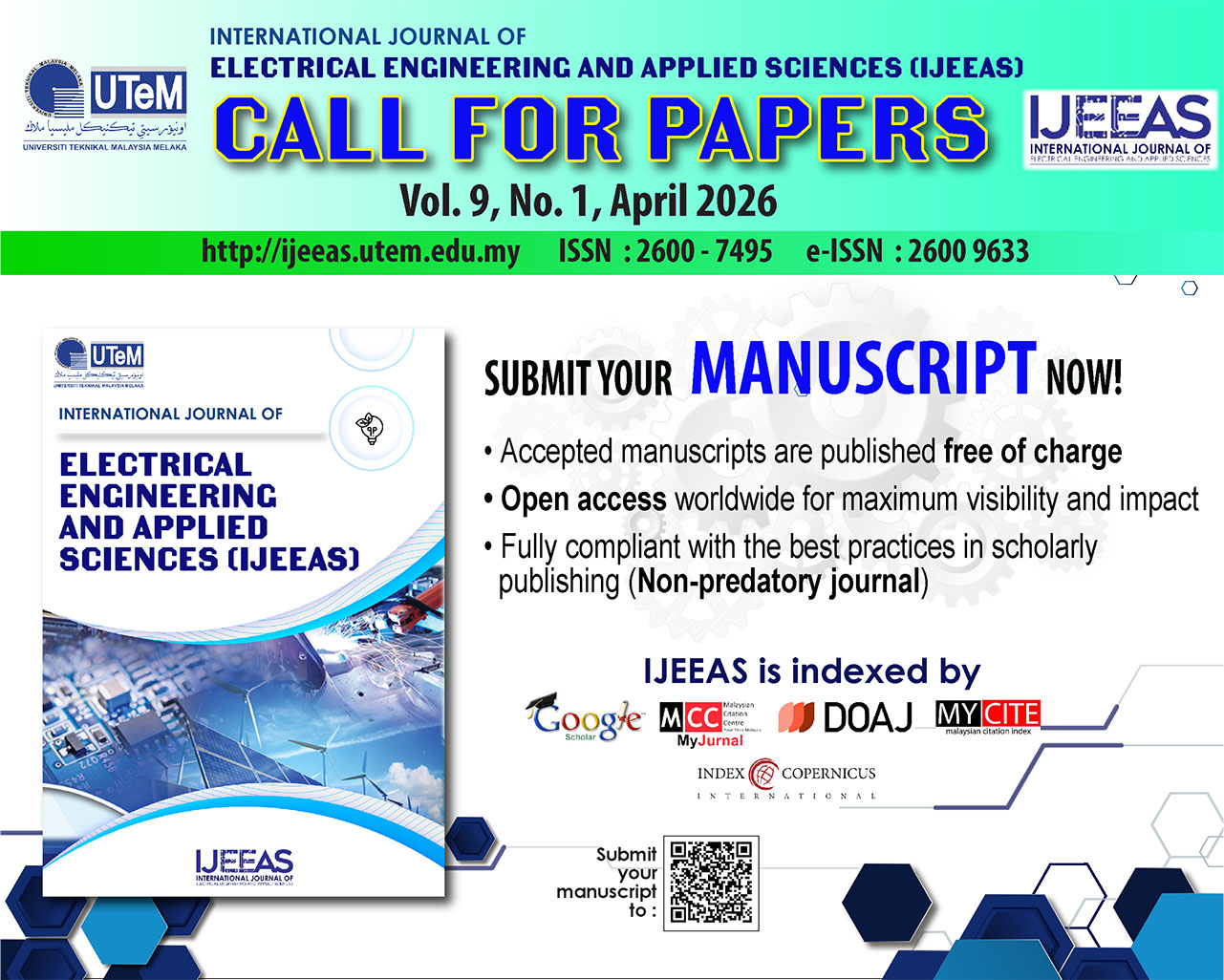Design and Operation Strategy for a Grid Connected Micro Power System
Keywords:
energy saving, operation strategy, power reliability, renewable energy sources, utility gridAbstract
The growing demand for a sustainable power system is motivating worldwide interest in alternative technology. The renewable sources are capable of supplying the required energy but are intermittent and location dependent. A micro power system, if optimally designed can be more reliable and cost effective than a single power source. The overall aim of this paper is the design and operation strategy for a grid connected micro power system for reliable and cost effective energy utilisation. The designed micro power system, is made up of three power sources (solar photovoltaic, grid and fossil-fuelled generator), and utilises a microcontroller based system to reliably organise the flow of the hybrid power mix from different sources and battery bank in a costeffective
manner. The microcontroller was programmed to monitor the DC voltage levels of the battery bank to decide which source powers the load. The results showed that the developed strategy yielded grid energy savings of 66.7%, reliability enhancement of 6.1% and reduction of pollutant emission by 36.7% compared to the conventional strategy. The high energy saving as well as improved power supply reliability of the developed strategy has become increasingly necessary especially in the face of exorbitant power supply rates of the various electric power distribution companies in Nigeria. Moreover, the implementation of the developed operation strategy can make the ecosystem more friendly and clean.
Downloads
References
A. Aliyu, A. Ramli, and M. Saleh, Nigeria Electricity Crisis: Power Generation Capacity Expansion and Environmental Ramifications,
Energy, Vol. 61(No. 8): 354-367, 2013.
N. Kaseke, and S. Hosking, Sub-Saharan Africa Electricity Supply Inadequacy: Implications, Organisation for Social Science
Research in Eastern and Southern Africa, 113-132, 2013.
M. S. Okundamiya, Modelling and Optimization of a Hybrid Energy System for GSM Base Transceiver Station Sites in Emerging Cities, Ph.D. thesis, Dept. Elect. Elect. Eng. University
of Benin, Benin City, Nigeria, 2015.
M. S. Okundamiya, J. O. Emagbetere, and E. A. Ogujor, Design and Control Strategy for a Hybrid Green Energy System for Mobile
Telecommunication Sites, Journal of Power Sources, Vol. 257, 335 – 343, 2014.
S. Rahmstorf, Anthropogenic Climate Change: Revisiting the Facts, in Global Warming: Looking Beyond Kyoto, E. Zedillo, Ed.,
pp. 34–53, Brookings Institution Press, Washington, DC, USA,2008.
J. R. VandeWeghe, and C. Kennedy, A Spatial Analysis of Residential Greenhouse Gas Emissions in the Toronto Census
Metropolitan Area, Journal of Industrial Ecology, Vol. 11(No.2):133–144, 2007.
M. S. Okundamiya, and O. Omorogiuwa, Analysis of an Isolated Micro-Grid for Nigerian Terrain, 2016 IEEE 59th International
Midwest Symposium on Circuits and Systems, Abu Dhabi, UAE,485-488, 2016.
B. Yan, P. B. Luh, G. Warner, and P. Zhang, Operation and Design Optimization of Microgrids with Renewables, IEEE Transactions
On Automation Science And Engineering, Vol. 14(No. 2): 573 –585, 2017
P. G. Arul, V. K. Ramachandaramurthy, and R. K. Rajkumar,Control Strategies for a Hybrid Renewable Energy System: A
Review, Renewable and Sustainable Energy Reviews, Vol.42, 597-608, 2015.
B. Khan, P. Singh, Selecting a Meta-heuristic Technique for Smart Micro-grid Optimization Problem: A Comprehensive Analysis,
IEEE Access, Vol. 5, 13951 – 13977, 2017; doi:10.1109/ACCESS.2017.2728683
R. P. Canizares, and R. Palma-Behnke, Trends in Micro-Grid Control, IEEE Transaction on Smart Grid, Vol. 5(No. 4):1905 –
, 2014.
M. S. Okundamiya, J. O. Emagbetere, and E. A. Ogujor, Optimisation Models for Hybrid Energy Systems – A Review,Proceedings of the 2017 IEEE 3rd International Conference on Electro-Technology for National Development (NIGERCON),
Owerri, Nigeria; 878 – 887, 2017.
K. Roy, and K. K. Mandal, Hybrid optimization algorithm for modelling and management of micro grid connected system, Front.
Energy, Vol. 8(No. 3), 305–314, 2014.
D. Bo, Y. Li, and Z. Zheng, Energy Management of Hybrid DC and AC bus linked Micro-grid, in 2010 2nd IEEE International
Symposium on Power Electronics for Distributed GenerationSystems (PEDG), 713-716, 2010.
M. Dahmane, J. Bosche, A. El-Hajjaji, and M. Dafarivar, Renewable Energy Management Algorithm for Stand-alone
System, in: proceedings of the International Conference on Renewable Energy Research and Applications, 621–626, 2013.
O. Lanre, S. Mekhilef, M. S. Ismail, and M. Moghavvemi, Energy Management Strategies in Hybrid Renewable Energy Systems: A
Review, Renewable and Sustainable Energy Reviews, Vol. 62, 821-835, 2016.
Y. Han, W. Chen, and Q. Li, Energy Management Strategy Based on Multiple Operating States for a Photovoltaic/Fuel Cell/Energy
Storage DC Micro-Grid, Energies, 10, 136, 2017.
J. Jurasz, and A. Piasecki, A Simulation and Simple Optimization of a Wind-Solar-Hydro Micro Power Source with a Battery Bank
as an Energy Storage Device, EDP Sciences, 140, 10, 2017.
Karunakaran Venkatesan, and Uma Govindarajan, Optimal power flow control of hybrid renewable energy system with energy
storage: A WOANN strategy, Journal of Renewable and Sustainable Energy 11, 015501 (2019); doi: 10.1063/1.5048446
Xiaohui Yang, Jiating Long, Peiyun Liu, Xiaolong Zhang, and Xiaoping Liu, Optimal Scheduling of Microgrid with Distributed
Power Based on Water Cycle Algorithm, Energies 2018, 11, 2381;doi:10.3390/en11092381.
Downloads
Published
How to Cite
Issue
Section
License
Authors who publish with this journal agree to the following terms:
- Authors retain copyright and grant the journal right of first publication with the work simultaneously licensed under a Creative Commons Attribution License that allows others to share the work with an acknowledgement of the work's authorship and initial publication in this journal.
- Authors are able to enter into separate, additional contractual arrangements for the non-exclusive distribution of the journal's published version of the work (e.g., post it to an institutional repository or publish it in a book), with an acknowledgement of its initial publication in this journal.
- Authors are permitted and encouraged to post their work online (e.g., in institutional repositories or on their website) prior to and during the submission process, as it can lead to productive exchanges, as well as earlier and greater citation of published work (See The Effect of Open Access).







